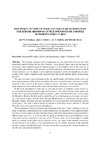Please use this identifier to cite or link to this item:
https://accedacris.ulpgc.es/jspui/handle/10553/43160
| Title: | Influence of type of wave and angle of incidence on the seismic response of pile foundations and pile supported structures | Authors: | Zarzalejos, José M. Aznárez, Juan J. Padrón, Luis A. Maeso, Orlando zarzalejos |
UNESCO Clasification: | 250705 Sismología y prospección sismica 330506 Ingeniería civil 330533 Resistencia de estructuras 330510 Cimientos |
Keywords: | Structural Dynamics Earthquake Engineering Angle of Incidence SSI |
Issue Date: | 2011 | Journal: | ECCOMAS Thematic Conference - COMPDYN 2011: 3rd International Conference on Computational Methods in Structural Dynamics and Earthquake Engineering: An IACM Special Interest Conference, Programme | Abstract: | The dynamic response of pile foundations and pile supported structures has beenextensively studied during the last four decades. Even though, there exists yet the need ofachieving a better understanding on different aspects of the problem, such as the response ofinclined piles, the influence of the presence of nearby structures, the importance of various kindsof non-linearities, or the influence of the different parameters of the soil-foundation-structuresystem on the seismic response of the superstructure and on the internal efforts arising alongthe piles.The type of seismic waves impinging on the site, and the angle of incidence of the waves, areimportant parameters of the seismic excitation. However, vertical incidence of waves is usuallyassumed in the analysis of the seismic response of piles, and only a small percentage of thelarge amount of works related to this topic take the angle of incidence into account.In this work, the influence of the type of wave and its angle of incidence on the seismic re-sponse of pile foundations and pile supported structures is investigated using a direct approach.To this end, a frequency-domain boundary element - finite element formulation is used, beingthe Boundary Element Method used to model the soil as a homogeneous, isotropic, viscoelas-tic, semi-infinite region; and the Finite Element Method used to model both piles (as Euler-Bernoulli beams) and superstructure (formed by horizontal rigid slabs and extensible verticalelastic piers). The code is able to model the incidence of Rayleigh waves, and also P, SH andSV body waves with a general angle of incidence.The formulation is briefly presented at the beginning of the paper. Some validation results, interms of kinematic interaction factors of pile foundations, are presented. Then, different resultsin terms of internal efforts in piles and inter-storey drift in the superstructure are presented fordifferent types of waves. It is shown that the angle of incidence has a great influence on thestructural response, especially in the case of the SV wave, where the critical angle (at whichthere is a change in the nature of the reflected waves, and whose value depends exclusivelyon the Poisson’s ratio) plays a very important role, as the seismic response of the structureincreases greatly around such angle. It is also shown that, in general, the vertical incidence isnot the most unfavourable situation. | URI: | https://accedacris.ulpgc.es/handle/10553/43160 | Source: | ECCOMAS Thematic Conference - COMPDYN 2011: 3rd International Conference on Computational Methods in Structural Dynamics and Earthquake Engineering: An IACM Special Interest Conference, Programme |
| Appears in Collections: | Actas de congresos |
Page view(s)
103
checked on Jan 4, 2025
Download(s)
38
checked on Jan 4, 2025
Google ScholarTM
Check
Share
Export metadata
Items in accedaCRIS are protected by copyright, with all rights reserved, unless otherwise indicated.
